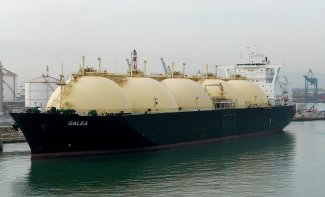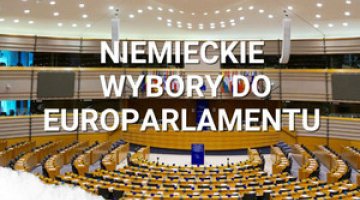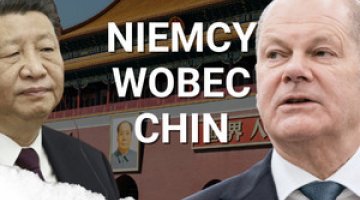An abundance of gas ports. The emergency diversification of gas supplies in Germany

The LNG terminal projects planned so far in Germany could not be implemented due to unfavourable regulatory and market conditions. The ability to opt for cheaper Russian gas, imported via pipelines, was one of the main obstacles since the German government saw no need to invest in securing supplies, mistakenly believing that it shared common interests with Russia as part of the two countries’ energy alliance. The aggression against Ukraine has revealed these beliefs to be myths and has become a catalyst for a profound revision of the approach to cooperation with Russia. Aware of the risk of cutting off gas supplies and the ensuing serious economic consequences, Germany has intensified its efforts and is taking emergency measures to develop LNG import infrastructure. In the short term, Germany will have four floating storage and regasification units (FSRU) which, combined with other measures to diversify supplies, will enable Germany to become independent of gas imports from Russia in 2024. This, however, does not automatically mean that Germany will decide to totally and permanently discontinue the imports of Russian gas.
Germany is the EU’s largest consumer of natural gas. Almost all of its demand is met by imports. Regardless of this, the country does not have a single liquefied gas terminal. While such facilities were being built in neighbouring countries (Poland, the Netherlands, Belgium and France), subsequent projects could not be implemented in Germany for several reasons.[1] Prospective investors complained primarily about too much competition from entities importing gas via gas pipelines, the unfavourable regulatory environment, the uncertain market situation and an increasingly ambitious climate policy. These factors reduced the market interest in the construction of gas terminals and increased the investment risk connected with them. The German government was not at pains to ensure favourable conditions for the implementation of projects of this kind, which further discouraged commercial investors and led to the projects failing. However, investments in gas terminals were blocked primarily because Germany and the dominant part of its business and industry circles opted for closer energy cooperation with Russia, thanks to which Germany was able to import cheaper gas through gas pipelines from the East for years. The belief in mutual dependence and the benefits of this energy alliance prevailed in Germany. Therefore, there was no interest or willingness to incur additional costs in order to improve the security of supplies and diversify the sources of natural gas.[2]
Since the summer of 2021, the perception of Russia as a partner in the trade in raw materials has been gradually changing among the German elite. Gazprom’s moves on the European gas market, which – despite strong bilateral ties between the countries – also affected Germany, were watched with growing concern. The Russian company limited deliveries to Europe and emptied warehouses, which contributed to a record increase in gas prices on the exchanges. As the Russian aggression on Ukraine escalated at the beginning of 2022, the risk of interruptions in supplies as a potential consequence of the political crisis in the East became the main topic of discussions in political and business circles in Germany.
The Russian attack on Ukraine serves as a catalyst
When Russia invaded Ukraine on 24 February, it led to a breakthrough and the announcement of a profound revision of Berlin’s previous policy towards Moscow. The measures taken by the government led by Olaf Scholz in response to the aggression include freezing the certification process of the Nord Stream 2 gas pipeline, significantly increasing defence funds, consent to far-reaching EU sanctions against Russia and the beginning of arms supplies to Ukraine.[3]
It seems that the greatest changes have taken place in Berlin’s approach to energy cooperation with Moscow. In a speech on 27 February in the Bundestag, Chancellor Scholz announced the construction of two LNG terminals (in Brunsbüttel and Wilhelmshaven), which – unlike with previous projects – saw the political involvement of the federal state in their implementation. This decision was intended to signal the will to diversify supplies and reduce the critical degree of Germany’s reliance on Russia in gas imports (in 2021, natural gas purchased from Gazprom accounted for slightly more than 50% of gas imports). On 4 March, plans were presented envisaging the state’s direct participation in the Brunsbüttel terminal project – the state-owned bank KfW acquired 50% of the shares and costs of the project (estimated at EUR 1 billion), which was an absolute novelty on the German liberalised and privatised gas market, and before the war such a move would have been unthinkable.[4]
Given the lack of alternative sources of gas imports available in the short term and the related potential serious economic consequences, Germany was among those EU member states which from the very beginning rejected the inclusion of an embargo on Russian raw materials in subsequent sanctions packages (the costs of introducing this restriction are estimated at 3–6% of GDP). However, the brutality of the aggression against Ukraine resulted in increasing pressure both from the public (most polls showed support for the embargo) and from NATO and EU allies to include the energy sector in sanctions. However, the decisive factor was that the German political and business elite fully realised the danger of the scale of the country’s dependence on Russia in the trade of raw materials (especially in the gas sector) and the risk to the economy in the event of an uncontrolled escalation and interruption of supplies; be it from Moscow or the West. The Federal Ministry for Economic Affairs and Climate Action (BMWK) led by Robert Habeck began to develop further plans to become independent from Russian oil and gas. In early April, Habeck revealed that Germany would be able to opt out from hard coal imports by summer 2022, from oil imports by the end of 2022, and from gas imports by mid-2024.
The latter move could be facilitated through the use of so-called floating gas ports (floating storage and regasification units, FSRU) which are possible to start up in a much shorter time than land-based terminals. In mid-March, when the media began to report on plans to install the first FSRU (initially, three were planned) next winter, there was the impression that each subsequent week brought information about new potential locations and even a kind of competition between the local authorities to attract investments and support for these investments from Berlin.
FSRU as a guarantor of gas supplies
On 5 May, during a ceremony at the port in Wilhelmshaven, Mr Habeck signed contracts concerning the lease of four FSRUs on behalf of the German government. Two of them will be leased from the Norwegian company Höegh LNG, and two more from the Greek shipowner Dynagas. The contract negotiations were mediated by the German energy companies RWE and Uniper, which will later be commissioned by the federal government to act as gas terminal operators. The details of the deals have not been disclosed. According to media reports, the contracts were concluded for a term of 7-10 years, and the cost of lease of the units would amount to nearly EUR 200,000 per day. It is known, however, that in the federal budget a total of EUR 2.94 billion has been reserved for financing the operation of four German FSRUs for the years 2022–2032. The final import capacities that the contracted units will have is also unclear. According to BMWK information, Germany would be able to import 33 billion m3 of gas annually due to them (in 2021, gas consumption in Germany was slightly over 90 billion m3, with 46 billion m3 coming from Russia). In turn, RWE reports that the two facilities negotiated by the company have an annual regasification capacity of 10–14 billion m3 of gas, and Uniper claims that ‘its’ units will be able to introduce up to 15 billion m3 of gas to the grid annually.
The BMWK plan assumes that the first floating gas port (Höegh Esperanza) will be anchored in Wilhelmshaven and put into operation at the end of 2022. This project will be possible to complete within such a short time frame due to the possibility of using the existing port infrastructure (preparatory construction work on the quay was inaugurated on 5 May). The declaration of the operator of the gas transmission network, OGE, that a nearly 30-kilometre connection with the NETRA gas pipeline will be built by the end of the year is another factor enabling the rapid completion (steel pipes have already been ordered and construction work is scheduled to start in August). Uniper will be the operator of FSRU Wilhelmshaven, and the unit will have an annual regasification capacity of 7.5–8 billion m3.
The second floating terminal will be anchored in the port of Brunsbüttel and is planned to be operational in early 2023. There is less information available about this project. It is known that it will be the second vessel chartered from Höegh (according to unconfirmed data it is the Höegh Giant LNG tanker), and RWE will be in charge of its operation. The terminal will probably enable up to 5 billion m3 of gas to be imported annually. It is not yet known how the issue of connecting to the transmission network will be resolved; it is approximately 60 km away from Brunsbüttel (there has been speculation in the media that rail tankers will be used to transport the gas).
It has not yet been decided where the two units leased from Dynagas (Transgas Force and Transgas Power) will be anchored. The governments of Lower Saxony (the ports of Stade and Wilhelmshaven are being considered as a project separate from Uniper), Hamburg and Mecklenburg-Vorpommern (Rostock and Lubmin are being considered; the latter being the site where the Nord Stream gas pipelines end in Germany) are competing for them. In addition, the port of Eemshaven in the Netherlands is also one of the possible options. The factors that will decide on the location of the projects will be: the possible date of their launch, the scope of necessary construction work, and the possibility of connecting to the transmission system. BMWK wants the last two FSRU units to be put into operation in May 2023.
Gas ports as an issue of particular public interest
It will be possible to implement the projects in a relatively very short time frame because a number of legal changes have been introduced, both at the federal and local levels. On 19 May, the Bundestag adopted an act that is meant to significantly accelerate the procedures related to the issuance of construction permits, allow for the abandonment of some practices related to the study of the environmental impact of the investments, shorten the period for submitting comments on projects, simplify public procurement procedures and limit the consideration of possible complaints to the courts of first instance. In the explanatory memorandum to the act, it is stated that due to Russia’s aggression on Ukraine, the “immediate” implementation of projects increasing the security of gas supplies to Germany is “indispensable”, and the investments themselves are of a “particular public interest” and serve public safety. Such legal wording is intended to make it easier for courts to settle possible lawsuits in favour of the projects. It is worth noting that the act covers not only projects related to the leased FSRU units, but also land-based LNG terminals (apart from the investment in Brunsbüttel, two private projects are being carried out: in Stade and Wilhelmshaven – see Appendix) and the construction of connectors with the gas network. The legal regulations limiting the period of LNG imports until 31 December 2043 ensure the compliance of the projects related to the import of LNG with the goals of Germany’s climate policy. After this deadline, it will only be possible to import emission-neutral energy carriers via gas terminals, i.e. mainly hydrogen and its derivatives (e.g. Uniper and RWE plan to import green ammonia through the terminals in Wilhelmshaven and Brunsbüttel, and the TES project envisages importing synthetic gas).
Regulations aimed at accelerating and facilitating the construction of gas terminals were also passed by the Landtag of Schleswig-Holstein (amendments to the water law). A similar intention was announced by Lower Saxony’s SPD-CDU government coalition. The Federal Network Agency (BNetzA), which has announced the introduction of a special discount on the tariff for access to the network for gas terminals, is also involved in the efforts to facilitate investments in LNG terminals. Moreover, the Association of Gas Transmission Network Operators (FNB Gas), after consulting BNetzA, postponed the update of the Gas Network Development Plan due to the need to include the imminent launch of the LNG import infrastructure.
The active engagement of the Habeck’s ministry in the launch of LNG terminals is fully supported by all of Germany’s major political groupings:; both the SPD-FDP-Greens coalition and the CDU/CSU opposition grouping (only the AfD and the Left have objections), as well as local business and industrial circles. The rapid creation of an LNG import infrastructure is of key importance especially for business and industrial circles because, from their perspective, the consequences of Russian gas supplies potentially being cut off will be disastrous. Habeck’s actions are also very positively assessed by German public opinion.[5] Most voters view him as an effective politician who solves problems that are important to them, and at the same time skilfully communicates and explains his actions via social media in a direct way that is understandable for the average person. Due to this, he is benefiting politically from the crisis, becoming Germany’s most popular and best rated politician.
The consequences of the construction of the gas terminals
The successful implementation of plans to build gas terminals (especially of the FSRU type) in the short term, may have far-reaching consequences. Firstly, in the perspective of the next winter, it increases the security of gas supplies to Germany in the event of a possible suspension of gas supplies by Russia (this scenario is treated as realistic, although unlikely). The launch of two FSRU units expected at the turn of 2022/2023, will not fully compensate for the possible lack of Russian supplies, but it will significantly increase the import possibilities. This, in turn, will reduce the scale of losses, especially for industry, which is most exposed to gas shortages (it would be the first ‘victim’ of its rationing).
Secondly, full implementation of the plans concerning the FSRU for the winter of 2023/2024 combined with other measures to diversify supply sources (increasing imports from Norway and the Netherlands and liquefied natural gas via gas terminals in neighbouring countries) will already make it possible to replace most of Russian supplies. If, as announced by Habeck, the share of Russian gas in Germany’s gas consumption drops to 30% by the end of the year, i.e. to around 30 billion m3 annually, in 2024 Berlin would (theoretically) be ready to implement a possible suspension of Russian supplies without serious consequences for the German economy (however, gas prices would be expected to rise on the exchanges).
Thirdly, the launch of additional import infrastructure on the assumed scale (both FSRU units and LNG land-based terminals planned for 2025-2026) will fundamentally change the architecture of the German gas market. If gas traders sign contracts with suppliers other than Gazprom, the strategic shift in the directions of supplies, undertaken for political reasons, will become more permanent. Importantly, the allocation of significant funds from the federal budget to cover the costs of operating the terminals will be a vital political factor prompting the current and future governments to ensure the actual use of gas terminals. This should lead to a lasting decline in Russia’s importance on the German (and European) gas market.
Fourthly, from the political point of view, the launch of the gas terminals will confirm Berlin’s withdrawal from the existing energy alliance with Moscow, discontinuing the dangerous dependence of the German economy on this supplier and, consequently, will reduce Germany’s current exposure to Russian energy blackmail, which will increase its (Germany’s) ability to pursue a more assertive policy towards Russia.
The challenges the FSRU projects are likely to face
Despite the announcement of legislative moves aimed at facilitating and accelerating the construction of gas terminals (especially of the FSRU type), the presented schedule for the commissioning of individual terminals raises serious doubts over its successful implementation. Putting the new import infrastructure into service requires undertaking adaptation construction work in the ports, as well as connecting it with the existing gas pipeline system. Apart from the Wilhelmshaven facility, where relevant steps have already been made, the details of how to address this issue in other locations are unknown.
In addition, German environmental organisations are protesting against the government’s plans to build LNG terminals. For example, the influential Deutsche Umwelthilfe (DUH) has long been actively contesting any new gas import projects. The organisation has used expert legal opinions and participated in administrative and court procedures to successfully impede investors’ plans to build the facilities in Brunsbüttel and Wilhelmshaven. German environmentalists not only question the location of the planned terminals due to their environmental impact, but also express doubts about the need to build them. DUH insists that BMWK should provide calculations confirming the need to do so, and quotes the expert opinion from the German Institute for Economic Research, according to which replacing Russian gas supplies without building gas terminals is possible. The main argument raised by DUH is the expected lock-in effect: gas terminals would extend the period of using natural gas in the economy, which would hinder decarbonisation efforts. The government’s policy concerning LNG has led to a serious dispute between the Green Party and environmentalists. For years, the two sides have been considered allies in pushing through the energy and climate agenda. Habeck even publicly called on environmental organisations to abandon the fight against LNG projects, pointing to the fact that taking legal action challenging the investments adversely affects Germany’s efforts to become independent from Russian supplies. DUH representatives responded to this with ridicule and went so far as to claim that Habeck belongs to the fossil fuel industry lobby.
Ensuring LNG supplies to the planned gas terminals is still an unresolved issue. Considering the limited availability of natural gas on the global market in the near future, ensuring sufficient quantities of gas by the next winter is challenging. One of the goals of Habeck’s visits to the US, Norway and Qatar was to facilitate talks between German oil importers and potential exporters. However, no supply contracts have yet been signed. One potential problem in the negotiations is the exporters’ preference for long-term contracts (of up to 20 years), which is not in line with German climate policy, which assumes a significant reduction in natural gas consumption in the 2030s and an (almost complete) gas opt-out by the mid-2040s at the latest.
The tight schedule for the implementation of LNG projects caused by the crisis is of major political importance as it may contribute to the success of the plans for the entire energy transformation (Energiewende). The Scholz government plans to ratchet up the pace of construction of wind farms and photovoltaic farms and the related acceleration of the expansion of power grids. In the German context, these investments encounter various bureaucratic, procedural and judicial obstacles. Due to these obstacles the projects are completed with delays of up to several years. Habeck has presented an ambitious schedule for the rapid installation of floating LNG terminals as a test of whether the bureaucratic barriers, the ‘Achilles' heel’ of transformation, can be broken, to prove that speeding up Energiewende projects is possible even in German conditions. One example of such a successful investment, which is often mentioned in the debate, is the Tesla factory near Berlin that was built in just over two years.
Will Germany opt out from Russian gas? An open question
It seems that a qualitative change in the approach to developing energy cooperation with Russia has taken place among the vast majority of the German political and business elite. Due to Russia’s aggressive policy in the EU’s immediate neighbourhood, it has not only ceased to be perceived as a dependable supplier and a reliable and stable partner in the field of the trade in raw materials, but is also increasingly being treated as a source of instability and threats to the business models of German companies. The vision that gas supplies from Russia could be reduced or completely cut-off, given the absence of alternative supply sources, has become a strong impulse, especially for German industry, to revise the approach to cooperation which has thus far been applied. It seems that in the foreseeable future, a return to business as usual (understood as a multi-faceted energy alliance) is out of the question. The most important conclusion Berlin has come up with is the need for real, not feigned, diversification, and avoiding similar dependencies (including in the context of importing fuels of the future, such as hydrogen and its derivatives).
The diversification plans that are being implemented are expected to enable the German economy to function without hydrocarbons from Russia, if necessary. However, this does not automatically mean that Germany will ultimately decide to completely and permanently opt out from importing them. This will be a political decision and will depend primarily on developments in Ukraine and Moscow’s future moves. If Russia’s relations with the West become less strained, some business circles in Germany will certainly try to maintain (or unblock) the trade in hydrocarbons, raising economic arguments, especially the importance of cheap raw materials for the competitiveness of German industry. If relations with Russia are normalised, a section of the German political scene and public opinion will be susceptible to such argumentation.
APPENDIX
Table. German LNG infrastructure construction projects (planned and under consideration)

Source: author’s calculations based on information provided by BMWK and individual investors.
Map. The location of planned LNG and FSRU terminals in Germany

Source: Bundesministerium für Wirtschaft und Klimaschutz (BMWK).
[1] M. Kędzierski, ‘Niemieckie terminale LNG – stan i perspektywy’, Komentarze OSW, no. 362, 10 November 2020, osw.waw.pl.
[2] M. Kędzierski, ‘A dangerous dependence on Russia. Germany and the gas crisis’, OSW Commentary, no. 427, 23 February 2022, osw.waw.pl.
[3] A. Kwiatkowska, ‘Germany radically revises its policy towards Russia’, OSW, 1 March 2022, osw.waw.pl.
[4] M. Kędzierski, ‘Niemcy: wsparcie państwa dla budowy terminalu LNG w Brunsbüttel’, OSW, 10 March 2022, osw.waw.pl.
[5] In the DeutschlandTrend poll conducted in April, 76% of respondents supported a complete withdrawal from Russian hydrocarbon imports, with 22% supporting an immediate embargo, and 54% a gradual withdrawal from Russian supplies. 19% of respondents voted in favour of maintaining the trade. Habeck’s work in this survey was positively evaluated by 56% of Germans (30% expressed a negative opinion).




